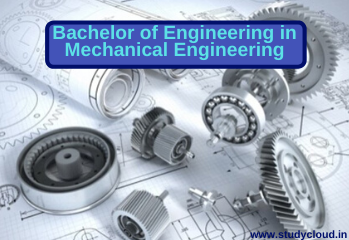We have sent password reset instructions and OTP. Please check your inbox
Don't have an account? Sign Up with us

Enter the below information to Reset Password
Successfully OTP Sent

Enter the below information to Reset Password
Please Enter OTP
Successfully OTP Sent
We have sent password reset instructions and OTP. Please check your inbox
Please Enter OTP
Successfully OTP Sent
We have sent password reset instructions and OTP. Please check your inbox
Please enter your email address below and we will send you instructions for setting a new password.

Incase you have already completed your registration process please enter your mobile number here to activate your account:

Bachelor of Engineering in Mechanical Engineering

Author Name
@Krish Shah
 Published on
May 18th 2020
Published on
May 18th 2020
Bachelor of Engineering in Mechanical Engineering
Introduction
Mechanical Engineering is an important branch of Engineering as it focuses on building and maintaining structures, machinery and many more. Students seeking a career in this field must have an appropriate degree and Bachelor of Engineering in Mechanical Engineering also known as B.E. in Mechanical Engineering is one of the most suitable and prefered course. It is a 4-year long undergraduate course in the field of mechanics. The course focuses on some of the major subjects of science like mechanics, kinetics, statistics, material science, thermodynamics, and structural dynamics used in the development, designing, production, construction, operation, installation, and maintenance of machines, tools, and various other mechanical equipment. The course includes 4 semesters each providing a basic study of mechanics and computer. The program comprises of necessary topics like Engineering Graphics, Electrical Technology, Computer Graphics, Numerical and Statistical Methods, Production Technology, Advanced Solid Mechanics, Industrial Tribology, Ergonomics and such related subjects.
The average annual fee charged by private as well as government institutes in India for offering this course ranges between ₹30,000 - ₹25,00,000. After pursuing this course, the graduates get an opportunity to choose a job profile from a field of their choice. They can be employed in various fields like Aeronautical industry, Chemical industry, Automobile industry, Electronics industry, Construction firms, Petroleum industry, Power plants, Textile industries and related field. Some of the positions available for B.E. in Mechanical Engineering graduates in the above fields are Mechanical Engineer, Service Engineer, Consultant, Instructional Designer, Mechanical designer and relevant posts. They can expect an average annual pay ranging anywhere between ₹5,00,000 - ₹9,00,000 depending upon the various factors such as job profile, skill hey possess and so on.
Eligibility
Applicants willing to pursue the course of Bachelor of Engineering in Mechanical Engineering from an institute have to prove their eligibility for which they have to fulfil the requirements criteria asked by the respective institute. The requirements may differ from institute to institute although most institutes ask the standard requirements. The requirements may include securing a certain score in the previous examination and so on. Given below are the standard requirements asked in most institutes in India.
- Applicants must have completed 10+2 level of education in the stream of Science from a recognised board.
- Applicants must have Physics, Chemistry and Mathematics as the primary subjects at 10+2 level.
- Applicants must secure a minimum score of 55% in Physics, Chemistry and Mathematics.
- Some institutes provide lateral entry to the Diploma holders in any stream from a recognised board or university.
Syllabus
B.E. in Mechanical Engineering is a 4-year long course focusing on the structural and mechanical part of the business. The examinations held in this course are on the semester-based system which means the course includes 8 semesters. The course focuses on mechanics, kinetics, statistics, material science, thermodynamics, and structural dynamics used in the development, designing, production, construction, operation, installation, and maintenance of machines, tools, and other mechanical equipment. The curriculum introduces students with subjects dealing in planning and designing machinery or an area depending upon requirements and space. Some of the topics covered by his program are Engineering Graphics, Electrical Technology, Computer Graphics, Numerical and Statistical Methods, Production Technology, Advanced Solid Mechanics, Industrial Tribology, Ergonomics and so on. The curriculum is showcased in the table below in the semester-based system.
Semester | Subjects |
Semester I |
|
Semester II |
|
Semester III |
|
Semester IV |
|
Semester V |
|
Semester VI |
|
Semester VII |
|
Semester VIII |
|
Institutes
Many institutes in India offer the course of B.E in Mechanical Engineering. Some of these are private while others are government-administered institutes. The primary difference both the types of institutes are the fees charged for the course and service they provide. Private institutes charge a high cost for offering this course and provide excellent services while government institutes charge a minimal fee and offer service accordingly. The average annual fee charged by both private and government institutes in India for offering this course ranges between ₹30,000 - ₹25,00,000. Some of the famous institutes in India offering this course are mentioned in the table below along with few details of them.
Institute | City | Average Fee |
Chandigarh | ₹5,56,000 | |
Pune, Maharashtra | ₹3,52,000 | |
Birla Institute of Technology and Science (BITS) | Pilani, Rajasthan | ₹12,83,000 |
Chidambaram, Tamil Nadu | ₹3,20,000 | |
Vishakapatnam, Andhra Pradesh | ₹8,00,000 | |
Baroda, Gujarat | ₹84,000 | |
Pune, Maharashtra | ₹3,20,000 | |
Ranchi, Jharkhand | ₹7,21,000 | |
Bangalore, Karnataka | ₹6,80,000 | |
Mumbai, Maharashtra | ₹3,44,000 |
Future Prospects
B.E in Mechanical Engineering brings a lot of job opportunities for graduates. They can choose the job position of their choice since there are plenty of jobs available in various mechanics oriented fields like Aeronautical industry, Chemical industry, Automobile industry, Electronics industry, Construction firms, Petroleum industry, Power plants, Textile industries and related field. Some of the positions available for B.E. in Mechanical Engineering graduates in the above fields are Mechanical Engineer, Service Engineer, Consultant, Instructional Designer, Mechanical designer and relevant posts. They can expect an average annual pay ranging anywhere between ₹5,00,000 - ₹9,00,000 depending upon the job profile and skills set.
Job Profile | Description | Average Annual Salary |
Mechanical Engineer | Mechanical Engineer's duties include analysing and solving the problems faced by thermal and mechanical devices. They plan, develop and test the prototypes of the devices and depending upon the results improvements are made. | ₹6,00,000 - ₹7,00,000 |
Service Engineer | Service Engineers are responsible for managing and servicing the machinery generally used in industries. They verify the coveted output from the functioning of the machine. They perform frequent checks on the working of the machinery and ensure the performance of the machinery. | ₹5,00,000 - ₹6,00,000 |
Consultant | Consultants design plans depending upon the client's requirements and execute them appropriately after the approval of the client. They stay in touch with the client closely and try to understand their opinion the structure and try to fit the design in the space. | ₹8,00,000 - ₹9,00,000 |
Instructional Designer | Instructional Designers are in charge of creating learning activities and compelling course content for improving remembrance. They gather data of requirements from the clients and depending upon the data instructions and goals are prepared. They frequently carry out researches for improving the learning experience for the learners. | ₹7,00,000 - ₹8,00,000 |
Mechanical Designer | Mechanical Designers are responsible for evaluating, introducing specifications and developing mechanical layouts. They may work with other associates for deciding the materials to be used or work upon the requirements of the clients. They also have to prepare a basic machine ideal model as per the client's instructions. | ₹5,00,000 - ₹6,00,000 |
-

bhaktisejal@gmail.com 5 years
Thank you sir for this information
-

babita.maurya@yahoo.com 5 years, 3 months
Thanks for information



User Already Exists
A user with email address you entered already exists with us ! Try to sign in.